Libya: Fears Grow over Gaddafi's Missing and Looted Weapons

In the aftermath of the Libyan conflict, weapons hidden by Muammar Gaddafi are being discovered across the country, but despite the National Transitional Council's assurance the armaments are being taken to secure places, reports that sites are being looted keep on emerging.
More weapons have been found this week, according to the NTC, after chemical warheads were recovered.
"They are from the Gaddafi era and are under guard, until they can be handed over," an NTC representative said at a meeting between the council and NATO representatives in Qatar.
The new findings prove that despite promising then-Prime Minister Tony Blair he would get rid of his weapons of massive destruction after the "deal in the desert" was sealed in 2004, Gaddafi decided to hide them instead.
The news will come as a blow to Blair, who at the time claimed he had persuaded the dictator to give up his highly controversial weapons of mass destruction programme, which ended up being used by the dictator's forces during the conflict to kill rebel fighters.
Ian Martin, head of the UN mission in Libya, told a Security Council meeting that various new undeclared sites storing chemical weapons had been uncovered since the fall of Gaddafi's government.
The Gaddafi regime had "accumulated the largest known stockpile of anti-aircraft missiles," Martin said.
"Thousands were destroyed during NATO operations. But I have to report to you our increasing concerns over the looting and likely proliferation of MANPADS, (Man-Portable Air Defence Systems)" he added.
While the regime has now collapsed and the leader is dead, security issues are still growing after reports that many sites containing weapons and ammunitions have been looted, a fact acknowledged by Martin.
While officials insist that the NTC is now in charge of the nuclear and chemical weapons materials, rumours that rebel fighters and civilians have had access to the sites and taken large amounts of weapons with them are fuelling fears that a new insurgency could erupt, should the NTC fail to keep its own forces under control.
Reports also suggest that hundreds of sites are still to be inspected, increasing the risk of looting.
According to Martin, mines have been laid in various cities and large amount of unexploded bombs and missiles have also been found in Sirte and Bani Walid or even Tripoli.
"In Tripoli, many stockpiles are suspected in residential areas, including in schools and hospitals, where they seem to have been moved by Gaddafi forces to conceal them from airstrikes. They mostly remain unsecured," Martin said.
Libya has been awash with armament throughout the conflict and rights organisations have warned it will be hard to collect the weapons after the war.
Fears that weapons used during the war could now end up fuelling further insurgencies in Libya or abroad are now rising.
Weapons can be a lucrative business and can be sold at good prices on the black markets.
Human Rights Watch has also said that it had inspected two unguarded sites near Sirte which contained surface-to-air missiles, tank and mortar rounds, large numbers of munitions and thousands of guided and unguided aerial weapons.
The group warned that while inspecting a site that had already been looted, its representative saw civilians and armed fighters arriving with trucks to collect more weapons.
Fears that violence could mark the aftermath of the conflict also mounted after HRW discovered dozens of bodies killed and abandoned in Sirte, some said to have been executed.
Violations of human rights from both sides have been reported throughout the conflict and the rebels have been accused of mass abduction and detention, beating and routine torture, killings and atrocities.
More controversy followed after it transpired that Gaddafi might have been assaulted and executed after his capture, so news that fighters and civilians are now amassing weapons will only increase fears of a bleak future for Libya.
The NTC might now be recognised internationally as the legitimate representative of the Libyan people, but domestically, leaders still have to convince civilians, rebel fighters and Gaddafi loyalists that they can come up with an inclusive new transitional Cabinet.
The African continent has been plagued by the proliferation of small arms and light weapons, which is an immediate security challenge to both the individuals and the state so with Libya full of hidden weapons, civilians are still at risk, even after the end of the war.
© Copyright IBTimes 2024. All rights reserved.





